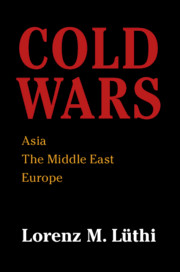Book contents
- Cold Wars
- Cold Wars
- Copyright page
- Dedication
- Contents
- Maps
- Acknowledgments
- Note on Names, Transliterations, and References
- Abbreviations
- Introduction
- 1 From High Imperialism to Cold War Division
- Part I Elusive Unities
- Part II Asia
- Introduction to Chapters 5 to 7
- 5 China
- 6 Vietnam
- 7 India
- Part III The Middle East
- Part IV Alternative World Visions
- Part V Europe between the Superpowers
- Part VI European Détente
- Part VII The End of the Regional Cold Wars
- Notes
- Index
5 - China
from Part II - Asia
Published online by Cambridge University Press: 19 March 2020
- Cold Wars
- Cold Wars
- Copyright page
- Dedication
- Contents
- Maps
- Acknowledgments
- Note on Names, Transliterations, and References
- Abbreviations
- Introduction
- 1 From High Imperialism to Cold War Division
- Part I Elusive Unities
- Part II Asia
- Introduction to Chapters 5 to 7
- 5 China
- 6 Vietnam
- 7 India
- Part III The Middle East
- Part IV Alternative World Visions
- Part V Europe between the Superpowers
- Part VI European Détente
- Part VII The End of the Regional Cold Wars
- Notes
- Index
Summary
The Chinese civil war 1927-49 was the first regional Cold War conflict. It pitted the internationally recognized Republican government of the Nationalist Party against the Chinese Communist Party. Although by 1945 China was elevated to great power status as a member of the United Nation Security Council, it was internally weak. Neither the nationalists nor the communists had significantly contributed to the end of imperialism in China by 1945. With the Nationalist defeat in 1949, the communists provided the country with a stable government for the first time in a century. However, during the following quarter of a century, their leaders were unable to agree on external and domestic policies. Should China aim at revolutionizing the international system, or seek a place in it through membership in the United Nations? Should the PRC introduce a utopian socialist society at home, or pursue sound socio-economic development policies? The failures of the Great Leap Forward and the Cultural Revolution, the successes of capitalist Asian countries like Japan and South Korea, and PRC membership in the United Nations eventually convinced Chinese leaders to forego revolution by the 1970s.
- Type
- Chapter
- Information
- Cold WarsAsia, the Middle East, Europe, pp. 117 - 137Publisher: Cambridge University PressPrint publication year: 2020

